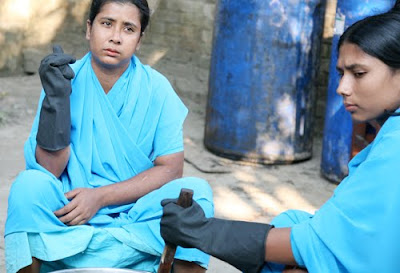
We extracted ourselves from Dhaka this morning at 6:30am and miraculously made it to Muktagacha in Mymensingh district by 9:30. After breakfasting on Bhaji and Daal at the Mennonite Central Committee office we set out for ISSD (Ideal Step for Sustainable Development). An Australian Baptist organization left this handicraft research and development project to MCC a few years ago. The structure wasn’t much more than poles holding up a corrugated tin roof but it’s a sophisticated birthing center for new product ideas. They are not short on sweat equity. The main effort these days is inventing a way to make thread from locally grown pinapple leaves and weaving it into gorgeous shear fabric. The process is painstakingly slow but the artisans are patient and persistent. We got to meet a man whose job it is to invent tools and he showed us the pineapple leaf threshing machine he had built. Coincidentally we also met our good friend Joe Manikam, Director of MCC Asia. Suraiya has invited us and Joe to her home for Eid celebrations on Saturday. What a stroke of good luck! We were hoping we would have the opportunity to observe this Muslim holiday up close in some way.
Weaving pineapple leaf cloth



Next was Bonoful Handmade Paper Products. Seeing Bonoful lessened my disappointment in not seeing Shuktara yesterday. Bonoful is a smaller “franchise” of Shuktara and they do many of the same things. I was thrilled to see a marble papermaking demonstration.
 These journals were designed for an Italian company. They're especially nice looking and, I think, a cut above the normal handicraft products.
These journals were designed for an Italian company. They're especially nice looking and, I think, a cut above the normal handicraft products.

Last stop of the day was Sacred Mark—a truly sacred place where women wishing to transition out of prostitution have been making beautiful handmade soap since March 2009. Their leader, mother figure, protector and mentor is Deepa, one of the most attractive people I’ve ever met. She radiates love in her slow liquid voice, graceful gestures and the gentle way she interacts with her girls. But this Muslim woman is no shrinking violet. She has a degree in civil engineering (helped design the architecture of Biborton) and could live in Dhaka where grand employment opportunities would be plentiful. But she has chosen to live in the home of her birth and build this center adjacent to the “red light” area of this small village. She explained to us the difficulty of leaving the sex trade. Having mothers who were prostitutes, lacking education, enduring regular beatings from their fathers, pimps and husbands these young women know no other life. It is also a solid source of income and without skills there is little motivation to make a change. But slowly Deepa is making inroads. They started their initial training with 100 and 30 managed to make it through the year long course. Even after graduation it is a constant struggle. Their husbands are usually not happy with the loss of income and many still abuse them. Deepa is working with the husbands as well to build trust. It helps that Sacred Mark, with support funds from MCC, pays salaries even when there are not enough orders for their product. But their soaps are packaged beautifully, the quality is high, and their story so poignant I think they will succeed if they can get their product seen by enough people. Everyone out there, buy some soap! Let me know if you want some and I will add it to my next Prokritee order. go to Bangladesh Day 7
Deepa showing us the soap making process. The blue robes the girls wear are their graduation gowns. It is their choice to wear them on days when guests are expected.
 Girls stirring. You can barely see it in this photo, but this young woman's arms and neck are covered in long scars. Her pimp would cut her when she didn't follow his wishes.
Girls stirring. You can barely see it in this photo, but this young woman's arms and neck are covered in long scars. Her pimp would cut her when she didn't follow his wishes.







If you happen to see my friend Ben Reesor, a fellow Mennonite from Ontario, in your travels, please say hello from me!
ReplyDeleteI'd love to know more about how to buy the soaps... please let me know if there's a simple way!
ReplyDeleteWe will take some soap, Annika!
ReplyDeletei am interested to visit the all activities, plz inform me contact number, e mail and location. specially water hyacinth made paper. plz plz
ReplyDeleteI would love to carry this soap in our new company in the states. Check out tradesofhope.com. Could you get me website addresses or how to contact for the soap especially and the paper for journals! Thanks for the great blog!!
ReplyDeleteGod bless,
holly